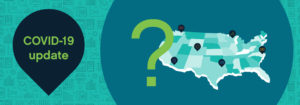The 8th Annual Health Datapalooza conference in Washington D.C. brought together a variety of data advocates who focused on how to harness the power of big data and put it into the hands of the people who benefit from it most: patients and providers. As part of the two-day event, one of our clients – Ian Morris, Clinical Data Interoperability Project Manager for the State of Mississippi, Division of Medicaid – presented as part of a panel titled “Health Systems Reaching Out to Patients and Providers.” During his presentation, Morris shared Medicaid’s experience of modernizing their Medicaid infrastructure and empowering real-time data sharing across all of Mississippi. In addition, Morris outlined lessons learned around interoperability and the roadmap for Medicaid’s interoperability efforts in years to come.
After the conference came to an end, we connected with Morris to discuss his experience at the event and other key takeaways. Morris shares his highlights below.
1. As a first-time attendee and presenter at Health Datapalooza, what intrigued you most about the event?
It was refreshing to hear the patient perspective. A lot of the time when you attend conferences that focus on data and analytics, you don’t get the rich patient narrative. However, Health Datapalooza took the imperative to put democratization of health data at the heart of the event. Empowering the physician and patient to take control of the data is what we’re all striving for, and that’s where organizations like Medicaid fit into the narrative. You need to understand the value of data first, and that’s where we – people such as interoperability managers – come into play. We translate that value, and once it’s understood by the provider, it can be shared externally with the patient.
2. What was a best practice that you learned from your peers and what do you hope to see at next year’s conference?
There were many presentations at the event that delved into the importance of collaborating between multiple state systems (i.e. bridging the broader health and human services, mental health and advocacy groups together) all for the greater good – improving patient outcomes via better data sharing. Such intricate collaboration efforts made me think of the initiatives Medicaid plans to embark on in the future. If there is one take away, it’s that statewide collaboration is key to better data sharing practices. My hope for next year’s conference is to have more speaking panels that touch upon just this, especially as it relates to interoperability efforts overall.
3. Other post-conference highlights that you’d like to share?
Health Datapalooza was full of energetic and enthusiastic data leaders. From patient advocates, to vendors to hands-on project managers, conference attendees and speakers embraced each other’s lessons and shared challenges of their own. Serving as a microcosm of what we’re all striving for in healthcare, Health Datapalooza reminds us that the sharing and analysis of data has a purpose – and that is ultimately to improve patient outcomes.
To read more about how Mississippi Division of Medicaid became the first Medicaid Agency to exchange clinical data summaries with their providers, read their story here. To learn more about how to act on your data and ensure quality, cost-effective care for Medicaid beneficiaries, visit our Provider Access solution here.
Get our take on industry trends
Avoid COVID-19 modeling pitfalls by eliminating bias, using good data
COVID-19 models are being used every day to predict the course and short- and long-term impacts of the pandemic. And we’ll be using these COVID-19 models for months to come.
Read on...Population Health Amid the Coronavirus Outbreak
In speaking with many colleagues throughout the provider and payer healthcare community, I’ve found an overwhelming sense of helplessness to the outbreak’s onslaught. This is exacerbated by the constant evolution of reported underlying medical conditions that indicate a higher risk of hospitalization or mortality for a coronavirus patient.
Read on...COVID-19 and the Financial Storm Ahead for Providers
Across the country, healthcare organizations are seeing 40%-80% declines in monthly charges with some of the most profitable services lines only seeing 20% of their normal monthly volumes during the pandemic.
Read on...3 Steps Any Healthcare Organization Can Take to Improve Enterprise Analytics
By Kristin Weir When it comes down to the most basic purpose of why organizations use analytics, it’s simple: they…
Read on...



